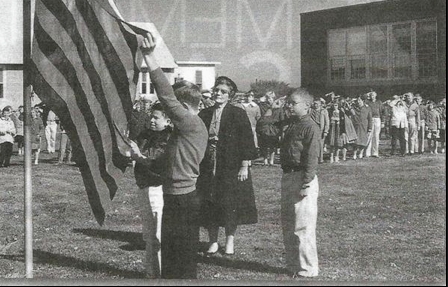Editor’s Note: The Chestertown Spy has teamed up with the C.V. Starr Center for the American Experience at Washington College to share the stories of local residents who experienced World War II on the Home Front as an adult or as a child. Students and staff have already interviewed over a hundred folks who experienced World War II abroad or on the Home Front. Fourteen students are continuing to interview local and regional residents this summer about their memories of what life was like for them during World War II. Please contact Program Director Michael Buckley if you have a story or an artifact to share at [email protected] or 410 810 7156.
Pat Ingersoll
What was it like living being a young farm wife during the war?
 “Insane, dear. I was married on a Saturday, and on Monday morning, I was bagging barley on the combine. And I found I had 400 chickens—damn chickens—and so I helped take care of them until 13 months after we were married [when] our oldest son was born. I divorced myself from the chickens. I didn’t like to be gone that long out of the house leaving a baby unattended.”
“Insane, dear. I was married on a Saturday, and on Monday morning, I was bagging barley on the combine. And I found I had 400 chickens—damn chickens—and so I helped take care of them until 13 months after we were married [when] our oldest son was born. I divorced myself from the chickens. I didn’t like to be gone that long out of the house leaving a baby unattended.”
“When we came here, we were in the old house, and we had had four tons of coal to heat the house for the winter. The ration board cut it in half; we had two tons of coal to heat that house. But I remember the baby, the first baby, there was a little bathroom up there, which was warmer, and I put his crib in there. I mean, it was the only place warm enough.”
“We sold cream. We had two or three cows. So in the kitchen, we had a cream separator, and then I delivered the cream in town. I knew every back door in town. Then that all had to be washed, and it was a royal pain. Our old refrigerator was a kerosene refrigerator, and I had never heard of such a thing. We had a terrible time to get a new refrigerator. But we didn’t have the health department hammering on us.”
“I smoked like a chimney, and it was very hard to get cigarettes. You had to know somebody in a drug store who sold them, and you had to know them very well. They didn’t give you a rationing card for cigarettes.”



Write a Letter to the Editor on this Article
We encourage readers to offer their point of view on this article by submitting the following form. Editing is sometimes necessary and is done at the discretion of the editorial staff.